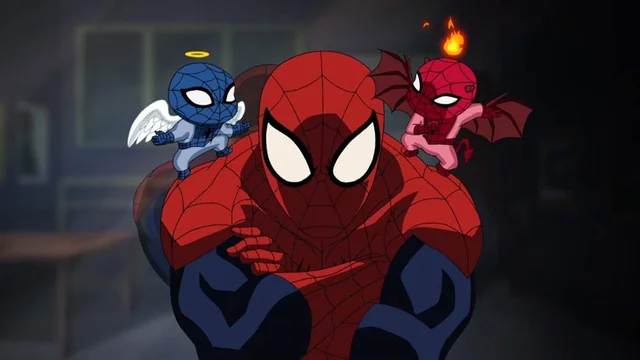In the realm of Marvel Comics, characters breaking the fourth wall often brings to mind the likes of Deadpool or She-Hulk. However, recent stories have seen Spider-Man, both Peter Parker and Miles Morales, flirting with this meta ability. Not only have these two Spider-Heroes made some remarkably insightful comments, but there’s also an in-world explanation for how they could possess the ability to shatter the franchise’s fourth wall.
In a preview for The Spectacular Spider-Men #1 by Greg Weisman and Humberto Ramos, Peter Parker and Miles Morales kick off their new team-up book with a casual hangout session. The duo, who haven’t spent much time together in recent comics, make a pact to remedy that with a weekly hangout – every Wednesday.
Throughout their hangout, which includes swinging through the city, battling the Jackal, and grabbing coffee, Peter and Miles engage in trivial yet meaningful conversation. In a moment that raises eyebrows, Peter remarks that it feels like he’s been a superhero “for sixty years or something,” while Miles muses that it feels like he’s been in high school “for a decade.”
These comments hint at their awareness of their existence within a comic book, a notion further underscored by their regularly scheduled Wednesday meet-ups, coinciding with the release of their weekly adventures in the real world.
The canonical explanation for this meta-awareness lies in the concept of the Web of Life and Destiny, fully elucidated in “A Single Thread” from 2022’s Edge of Spider-Verse #2. This narrative delves into the origins of the Web of Life and Destiny, elucidating its role in connecting every Spider-Hero to the multiverse.
Because Peter and Miles are both Spider-Men, they inherently have access to the multiverse through the Web of Life and Destiny. This provides them with the knowledge that they are, in fact, comic book characters. Thus, their seemingly self-aware comments find grounding in the established lore of the Spider-Verse.
With these tantalizing hints and a solid in-world explanation, Spider-Man, in both the forms of Peter Parker and Miles Morales, stands on the cusp of permanently shattering the fourth wall, offering readers a new dimension of storytelling.
FAQ
What does it mean for a character to “break the fourth wall”?
Breaking the fourth wall refers to a character acknowledging their existence within a fictional work, typically by directly addressing the audience or making references to the medium itself. It’s a metafictional device that blurs the line between fiction and reality.
Which characters are known for breaking the fourth wall in Marvel Comics?
While many characters have broken the fourth wall in comics, some notable examples include Deadpool, She-Hulk, and, more recently, Spider-Man (both Peter Parker and Miles Morales).
How do Peter Parker and Miles Morales exhibit meta-awareness in “The Spectacular Spider-Men #1”?
In the preview for The Spectacular Spider-Men #1, Peter Parker and Miles Morales make comments that suggest they are aware of their existence within a comic book. For example, Peter remarks that he’s been a superhero “for sixty years or something,” while Miles mentions feeling like he’s been in high school “for a decade.”
What is the canonical explanation for Spider-Man’s meta-awareness?
The canonical explanation lies in the concept of the Web of Life and Destiny, as detailed in “A Single Thread” from Edge of Spider-Verse #2. This narrative explores the origins of the Web of Life and Destiny, which connects every Spider-Hero to the multiverse and grants them awareness of their existence within comic book narratives.
How does the Web of Life and Destiny tie into Spider-Man’s meta-awareness?
Because Peter Parker and Miles Morales are both Spider-Men, they inherently have access to the multiverse through the Web of Life and Destiny. This connection provides them with the knowledge that they are comic book characters, explaining their seemingly self-aware comments in The Spectacular Spider-Men #1.
